-
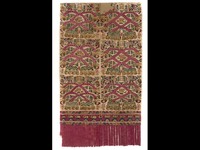 Lambayeque miniature tunic
Lambayeque miniature tunic This sleeveless tunic is decorated with a tree of life with branches, leaves, and flowers. The branches are tipped with zoomorphic heads and two condors perch in the top of each tree. The technique used in this tunic is slit tapestry.
-
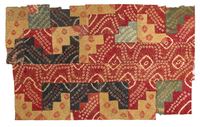 Nasca-Huari stepped and spiral motifs
Nasca-Huari stepped and spiral motifs Nasca-Huari Culture textile. This piece of cloth combines steps, that symbolize the connection between worlds, with spirals, as a symbol of regeneration. The technique is simple plain cloth patches sewn together (patchwork) and tie-dyed.
-
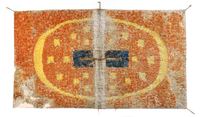 Nasca-Huari feathered tunic
Nasca-Huari feathered tunic Tunic of the Nasca-Huari culture. On this sleeveless tunic (unku), the central vertical band marks the line of the shoulders. The opening for the wearer’s head can be seen at the center of the garment.
-
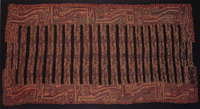 Paracas Mantle
Paracas Mantle This mantle is decorated with a feline creature (earthly world) which has two feet like those of a bird (celestial world), and the elongated body of a serpent (underworld). This mythological being combines the characteristics of the three worlds, evoking the Andean belief system. Funerary mantles were used by the people of Peru’s southern coast to wrap their dead in multiple layers, together with offerings, creating funerary bundles This funerary mantle is approximately 3000 years old.
-
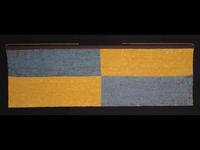 Nasca-Huari Feathered Panel
Nasca-Huari Feathered Panel Feather cotton fabric, with rectangular panels, four blue and yellow areas. The design and colors evoke the Andean concept of complementary duality. The golden yellow represents the sun, while the turquoise blue represents the ocean. The cords at the edges suggest that this standard was used to decorate the walls of temples or ceremonial spaces. This banner with blue and yellow macaw feathers was part of an offering made up of several similar banners in Ocoña, Arequipa.
-
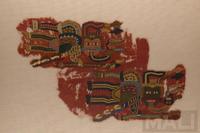 Paracas Cloak Fragment
Paracas Cloak Fragment Paracas Culture cloak fragment with embroidered designs of Mythical Anthropomorphic Being in-flight position holding staff and fruits. Serpentine appendages emanate from its body.
-
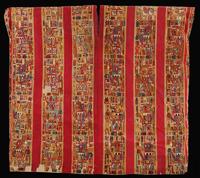 Huari Culture Tunic (Unku)
Huari Culture Tunic (Unku) Huari Culture Tunic (Unku) of two panels representing stylized figures that describe human characters with feline and camelid features carrying staffs and holding prisoners, arranged in transverse bands.
-
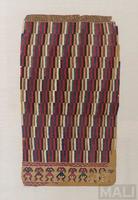 Chancay Culture cloth
Chancay Culture cloth Chancay Culture cloth with polychrome decoration of staggered diagonal stripes and horizontal bands at the top and bottom, complemented by motifs of felines and human figures.
-
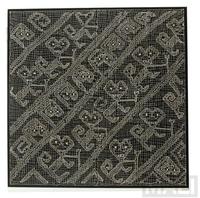 Chancay Culture Cloth with feline and wave designs
Chancay Culture Cloth with feline and wave designs Chancay culture textile. Cloth with embroidered designs of zoomorphic figures and waves in diagonal composition.
-
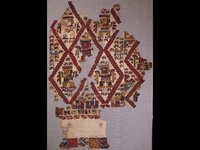 Mochica-Huari Textile
Mochica-Huari Textile Mochica-Huari brocade, Simple plain fabric decorated with additional wefts. This textile cloth represents characters with their heads in profile holding two staves, canes that leaders use as symbols of power. Probably from the Central Coast of Peru.
 Lambayeque miniature tunic This sleeveless tunic is decorated with a tree of life with branches, leaves, and flowers. The branches are tipped with zoomorphic heads and two condors perch in the top of each tree. The technique used in this tunic is slit tapestry.
Lambayeque miniature tunic This sleeveless tunic is decorated with a tree of life with branches, leaves, and flowers. The branches are tipped with zoomorphic heads and two condors perch in the top of each tree. The technique used in this tunic is slit tapestry. Nasca-Huari stepped and spiral motifs Nasca-Huari Culture textile. This piece of cloth combines steps, that symbolize the connection between worlds, with spirals, as a symbol of regeneration. The technique is simple plain cloth patches sewn together (patchwork) and tie-dyed.
Nasca-Huari stepped and spiral motifs Nasca-Huari Culture textile. This piece of cloth combines steps, that symbolize the connection between worlds, with spirals, as a symbol of regeneration. The technique is simple plain cloth patches sewn together (patchwork) and tie-dyed. Nasca-Huari feathered tunic Tunic of the Nasca-Huari culture. On this sleeveless tunic (unku), the central vertical band marks the line of the shoulders. The opening for the wearer’s head can be seen at the center of the garment.
Nasca-Huari feathered tunic Tunic of the Nasca-Huari culture. On this sleeveless tunic (unku), the central vertical band marks the line of the shoulders. The opening for the wearer’s head can be seen at the center of the garment. Paracas Mantle This mantle is decorated with a feline creature (earthly world) which has two feet like those of a bird (celestial world), and the elongated body of a serpent (underworld). This mythological being combines the characteristics of the three worlds, evoking the Andean belief system. Funerary mantles were used by the people of Peru’s southern coast to wrap their dead in multiple layers, together with offerings, creating funerary bundles This funerary mantle is approximately 3000 years old.
Paracas Mantle This mantle is decorated with a feline creature (earthly world) which has two feet like those of a bird (celestial world), and the elongated body of a serpent (underworld). This mythological being combines the characteristics of the three worlds, evoking the Andean belief system. Funerary mantles were used by the people of Peru’s southern coast to wrap their dead in multiple layers, together with offerings, creating funerary bundles This funerary mantle is approximately 3000 years old. Nasca-Huari Feathered Panel Feather cotton fabric, with rectangular panels, four blue and yellow areas. The design and colors evoke the Andean concept of complementary duality. The golden yellow represents the sun, while the turquoise blue represents the ocean. The cords at the edges suggest that this standard was used to decorate the walls of temples or ceremonial spaces. This banner with blue and yellow macaw feathers was part of an offering made up of several similar banners in Ocoña, Arequipa.
Nasca-Huari Feathered Panel Feather cotton fabric, with rectangular panels, four blue and yellow areas. The design and colors evoke the Andean concept of complementary duality. The golden yellow represents the sun, while the turquoise blue represents the ocean. The cords at the edges suggest that this standard was used to decorate the walls of temples or ceremonial spaces. This banner with blue and yellow macaw feathers was part of an offering made up of several similar banners in Ocoña, Arequipa. Paracas Cloak Fragment Paracas Culture cloak fragment with embroidered designs of Mythical Anthropomorphic Being in-flight position holding staff and fruits. Serpentine appendages emanate from its body.
Paracas Cloak Fragment Paracas Culture cloak fragment with embroidered designs of Mythical Anthropomorphic Being in-flight position holding staff and fruits. Serpentine appendages emanate from its body. Huari Culture Tunic (Unku) Huari Culture Tunic (Unku) of two panels representing stylized figures that describe human characters with feline and camelid features carrying staffs and holding prisoners, arranged in transverse bands.
Huari Culture Tunic (Unku) Huari Culture Tunic (Unku) of two panels representing stylized figures that describe human characters with feline and camelid features carrying staffs and holding prisoners, arranged in transverse bands. Chancay Culture cloth Chancay Culture cloth with polychrome decoration of staggered diagonal stripes and horizontal bands at the top and bottom, complemented by motifs of felines and human figures.
Chancay Culture cloth Chancay Culture cloth with polychrome decoration of staggered diagonal stripes and horizontal bands at the top and bottom, complemented by motifs of felines and human figures. Chancay Culture Cloth with feline and wave designs Chancay culture textile. Cloth with embroidered designs of zoomorphic figures and waves in diagonal composition.
Chancay Culture Cloth with feline and wave designs Chancay culture textile. Cloth with embroidered designs of zoomorphic figures and waves in diagonal composition. Mochica-Huari Textile Mochica-Huari brocade, Simple plain fabric decorated with additional wefts. This textile cloth represents characters with their heads in profile holding two staves, canes that leaders use as symbols of power. Probably from the Central Coast of Peru.
Mochica-Huari Textile Mochica-Huari brocade, Simple plain fabric decorated with additional wefts. This textile cloth represents characters with their heads in profile holding two staves, canes that leaders use as symbols of power. Probably from the Central Coast of Peru.